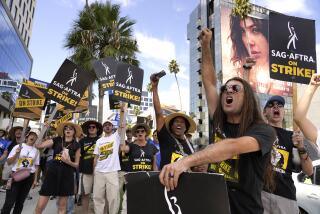Congress Set to Do Battle Over Extending Jobless Aid
- Share via
WASHINGTON — With jobless benefits lapsing today for nearly 800,000 workers and the economy still sputtering, top Republican lawmakers are laying plans to extend federal unemployment aid soon after Congress convenes in early January.
But a partisan battle is developing over how much aid should be approved. Democrats want to send more unemployment checks to the jobless in every state. Some leading Republicans want to limit assistance to states and workers they say need it most.
Whatever the outcome, both parties agree that unemployment aid has zoomed toward the top of the agenda for the 108th Congress. That’s a significant turnabout. The 107th punted on the issue in late November after President Bush declined to intervene.
But two weeks ago, after a sharp upturn in the monthly unemployment rate, Bush shifted course, seeking to neutralize an issue Democrats could use against him in the 2004 campaign.
The president urged the new Congress in his Dec. 14 radio address to extend jobless benefits under a temporary program enacted in March to stimulate an economy battered by recession and the Sept. 11 terrorist attacks. He also called for the benefit renewal legislation to apply retroactively to compensate jobless workers for aid they would lose after today.
Within days, House GOP leaders floated a plan to answer the president’s call. And this week, Senate Republicans agreed on the importance of the matter even as they were voting to promote Sen. Bill Frist of Tennessee to Senate majority leader.
“One of our first orders of business out of the box ... is to deal with the unemployment insurance problem that we have in the country right now,” said Sen. Rick Santorum of Pennsylvania, chairman of the Senate Republican Conference.
Democrats, anticipating today’s expiration of federal unemployment benefits, on Friday attacked House Republicans and Bush for allowing the program to run out.
“Regrettably, the House Republican leadership turned their backs on these families and refused to act, and the administration chose not to intervene before Congress adjourned,” said Senate Democratic leader Tom Daschle of South Dakota. “This inaction by Republicans was unconscionable then, and it is even more so now.”
Democrats also said Bush’s call for jobless benefits to be extended retroactively would be of small comfort to the many people who live from check to check.
An estimated 780,000 people will lose unemployment benefits as of today, including about 104,000 from California, according to congressional Democrats. These workers already had used up the typical 26 weeks of state jobless assistance and had been receiving additional benefits from the federal government under the March law.
But with the national unemployment rate at 6% in November -- an eight-year high -- the problem of expiring benefits encompasses more people than those directly affected today. More than 1 million jobless workers nationwide already had exhausted government benefits before the cutoff.
And an additional 90,000 or more per week are projected to do so in coming weeks. One is Nancy Miller, 53, of San Francisco. She was laid off in July from a well-paying job as a project manager for WorldCom Inc. Her $330 weekly unemployment check from the state, which had covered her mortgage and health insurance, will run out early next month. Miller, who is single and has no dependents, said her situation is not desperate. But she said she needs more income to tide her over until she can find a new job.
Until then, Miller said, she will have to skim from her already-depleted retirement savings. “We’re dipping into a pot that is starting to scrape bottom.”
Miller was one of many unemployed workers whom the AFL-CIO recruited to speak this week with reporters to spotlight the benefits issue.
The labor group also arranged a media conference call on Friday to publicize the plight of unemployed workers losing benefits just three days after Christmas.
On the line were workers and labor activists from Ohio, Pennsylvania, Alabama, Tennessee, Texas, New York and elsewhere -- all bitter at Congress for allowing the benefits to lapse.
“They give themselves a raise before they leave and leave all of us Americans high and dry,” said Laurie Carmichael, 39, mother of two and wife of an unemployed telecommunications worker who lives outside Dallas.
Lawmakers will get a 3.1% raise in January, boosting annual pay for senators and House members to $154,700 from $150,000.
In November, before Congress adjourned, the House and Senate failed to reconcile two bills they had passed to extend the benefits program. The Senate bill would have run the program an additional 13 weeks at a cost of $5 billion; the House version five weeks for about $1 billion.
Now, those bills have been set aside as lawmakers draft new measures in preparation for a clash in early January.
The leading Democratic plan, sponsored by Reps. Charles B. Rangel of New York and Benjamin L. Cardin of Maryland, would guarantee all unemployed workers as many as 26 weeks of federal benefits -- 13 more than what Congress authorized in March.
A tentative proposal by top House Republicans would allow those who, under the expiring program, did not receive the entire 13 weeks of extra federal benefits to collect them. It would also set up a nine-week federal aid program for the jobless in 16 states, including California, with high unemployment rates.
The plan would hitch these provisions to a tax break for business, halting for one year the jobless tax employers pay.
Both Democratic and GOP proposals would be paid for through the federal unemployment insurance fund, which has about $24 billion available.
More to Read
Get the L.A. Times Politics newsletter
Deeply reported insights into legislation, politics and policy from Sacramento, Washington and beyond. In your inbox twice per week.
You may occasionally receive promotional content from the Los Angeles Times.










